Vision
- To be recognized in the global scientific arena, with a marked specialization and excellence in Biochemistry.
- To provide an atmosphere for critical thinking to differentiate and interlink the various branches; cell biology, intermediary metabolism, clinical biochemistry, immunology, enzymology and endocrinology.
Mission
- To excel in the basic concepts and principles of Biochemistry
- To identify the problem in protocols in the thrust areas of research where the intervention of biochemist is essential
- To expose the students to the grooming areas of research with advanced instrumentation technique
- To correlate the anthropogenic inputs in the environment with the biochemical changes in the biological species and its impact on human life
- To understand the concepts in scientific learning for the process of experimentation and hypothesis testing.
Programme Educational Objectives (PEOs)
PROGRAM EDUCATIONAL OBJECTIVES (PEOs)
The Programme Educational Objectives of the M.Sc. in Immunology & Microbiology
programme at VISTAS are given below and are numbered from PEO1 to PEO4.
PEO 1: To provide the candidates with in-depth knowledge in immunology and microbiology and a firm grasp of the processes that employ or deal with microbes plus adept use of immunological techniques in relevant technologies that empowers them to deal with the safe and efficient use and monitoring of microbiological and immunological applications with development of competence on par with global standards and helps in the life-long learning of candidates.
PEO 2: To enable candidates by imparting updated analytical and hands-on skills to use and implement technological developments related to advanced and potential areas involving molecular diagnostics, automated systems of diagnosis, immunoblotting technology, upstream or downstream processing and nanotechnology with scope for upskilling upto future technologies so as to contribute effectively for Research & Development leading to patenting and publishing.
PEO 3: To train candidates to choose a decent career option either as Entrepreneur or having a high degree of employability; or pursue research – by providing training in interpersonal skills, sense of social responsibility, ethical and administrative acumen, ability to handle critical situations allowing them to be good team members and leaders as well as training to excel in competitive examinations.
PEO 4: To impart a strong sense of social responsibility with awareness of professional and societal ethical values and scope to develop leadership capabilities with the continuous need for lifelong learning.
Programme Outcomes (POs) & Programme Specific Outcomes(PSOs)
PROGRAM OUTCOME (PO)
PO1: Scientific knowledge: Graduates will acquire biochemistry/biotechnology / bioinformatics/ microbiology specific knowledge, including recent techniques in the respective fields coupled with hands-on skills and leadership skills for a successful career.
PO2: Problem analysis: Graduates will be able to analyse, solve and troubleshoot problems in implementation of biochemistry/biotechnology/ microbiological protocols.
PO3: Design/development of solutions: Graduates will develop creative thinking and cooperate with each other to solve problems in the field of biochemistry/biotechnology/bioinformatics/ microbiology.
PO4: Conduct investigations of complex problems: Graduates will acquire practical skills – which help in planning and designing protocols to validate hypothesis and execute experimental techniques independently as well as assimilate, analyse and interpret subsequent data.
PO5: Modern tool usage and communication: Graduates will effectively be able to manage resources and time using ICT and computer enabled devices and accomplish ability to understand and communicate all ideas effectively.
PO6: Environment sustainability and Ethics: Graduates will get adequate knowledge to use information and implement solutions for environmental protection and remediation. Graduates will be aware of their role and responsibility in handling and use of microbes including genetically modified microorganisms.
PO7: Lifelong learning: Graduates will carry on to learn and adapt in a world of constantly evolving technology.
PROGRAM SPECIFIC OUTCOME (PSO)
The overall outcome of graduates specific to M.Sc. in Immunology & Microbiology programme at VISTAS can be summarized as:
PSO 1: The ability to understand, implement and troubleshoot the concepts related to the fields of microbiology and immunology which will enable them to analyse and develop solutions to microbiology, immunology and rDNA related problems using knowledge and hands-on skills in microbiology, molecular identification, immunodiagnostics, screening for useful biomolecules and nanotechnology in the interpretation of data in relevant protocols.
PSO 2: The ability to gainfully become an entrepreneur by using microorganisms to mass produce biofertilizers, mushrooms or any other edible forms of SCP, fermented products and pharmaceutically important biomolecules as well as using knowledge, communication and practical hands-on training to become employed in diagnostic, industrial, pharmaceutical, food and research and development laboratories.
PSO 3: The ability to understand the principles and concepts underlying immunology and microbiology, including the interactions between microorganisms and the immune system and to Possess proficient laboratory skills in techniques relevant to immunology and microbiology, including culturing microorganisms, performing immunological assays, and molecular biology techniques such as PCR and sequencing etc.,
PSO 4: The ability to critically analyze the research in Immunology and Microbiology and to evaluate experimental design, methodology and interpretation of results and to understand the regulation of immune responses which includes the roles of different immune cells, cytokines and signaling pathways in health and disease.
PSO 5: For the effective scientific communication and to relate microbes and their role in ecosystem and public health research with wide opportunities and career prospects.
Curriculum & Syllabus
CURRICULUM & SYLLABUS
MINIMUM CREDITS TO BE EARNED: 90
| Hours/Week | Maximum Marks | |||||||
|---|---|---|---|---|---|---|---|---|
| Code No. | Course | Lecture | Tutorial | Practical | Credits | CA | SEE | Total |
| SEMESTER 1 | ||||||||
| Core | Core 1 – Chemistry of Biomolecules | 4 | 0 | 0 | 4 | 40 | 60 | 100 |
| Core | Core 2- Advanced Instrumental techniques | 4 | 0 | 0 | 4 | 40 | 60 | 100 |
| Core | Core 3 – Cellular Biochemistry | 3 | 0 | 2 | 4 | 40 | 60 | 100 |
| Core | Core 4 – Biochemistry & Instrumentation | 0 | 0 | 4 | 2 | 40 | 60 | 100 |
| DSE | DSE 1 | 4 | 0 | 0 | 4 | 40 | 60 | 100 |
| DSE | DSE 2 | 4 | 0 | 0 | 4 | 40 | 60 | 100 |
| SEC | Soft Skill 1/ Sector Skill Course | 2 | 0 | 0 | 2 | 40 | 60 | 100 |
| Total | 21 | 0 | 6 | 24 |
Eligibility Criteria
| Program | Program Duration (Year) | Eligibility | Criteria for Merit |
|---|---|---|---|
| M.Sc Biochemistry | 2 Years (4 Semesters) | Degree in Zoology, Botany, Biochemistry, Chemistry, Microbiology, Genetics, Biotechnology, Agriculture, Bio informatics, Nutrition & Dietetics and Life Sciences, BVSc., (10+2+3 pattern) | Merit based on the percentage of marks secured in the qualifying examination |
Career Prospects
CAREER PROSPECTS
- Forensic scientist
- Research analyst
- Medical coder
- Food safety analyst
- Food inspector
- Medical Representative
- Quality control in R & D of pharma and biotech companies.
Alumni Testimonials

Currently working in Aarthi scans and Labs @ Vadapalani, Chennai.
It was a great experience studying at Vels University, a memory to cherish for lifetime. My experience at Vels was full of learning and grooming. Being a great university, it gave me an opportunity to meet different kind of people from around the world and learnt many things from them. I am thankful to all the faculties, mentors and entire Biochemistry department for providing us with quality education. I am also grateful to faculties for organizing online classes in this pandemic situation and helping me for effective learning. Overall, it was a great experience and lifetime memory at VISTAS. If you want to make a career in Master degree would highly recommend you to join VISTAS.
Ms. S. Azeeza Sadaf. (MSc Biochemistry), 2019-2021
School of Life Sciences
Fee Structure
| Tuition Fee 2023 - 2024 (Per Sem) | Other Fee (Per Sem) | Total Fee 2024 - 2025 (Per Sem) |
|---|---|---|
| 25,000 | 20,000 | 45,000 |
Faculty of the Department
| Sl. No. | Name of the Faculty | Designation | Educational Qualification | Area of Specialization | Experience in Years | Vidwan ID | Photos |
|---|---|---|---|---|---|---|---|
| 1 | Dr.Usharani.B | Associate Professor and HOD | M.Sc., M.Phil, Ph.D | Diabetes, Cancer Biology | 19 years 2 months | 232684 | 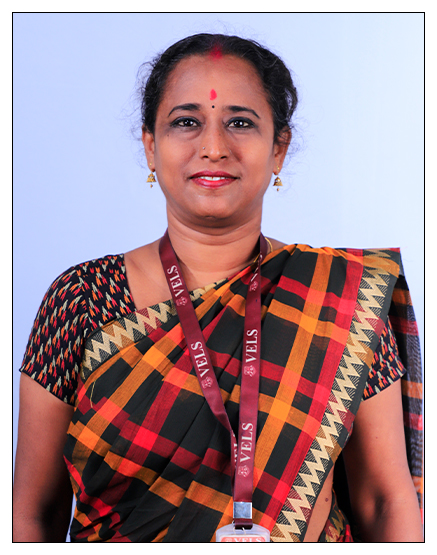 |
| 2 | Dr.Padmini.R | Associate Professor | M.Sc., M.Phil., Ph.D. | Cancer Biology, Nanoscience, pharmacology | 12 years 3 months | 232529 | 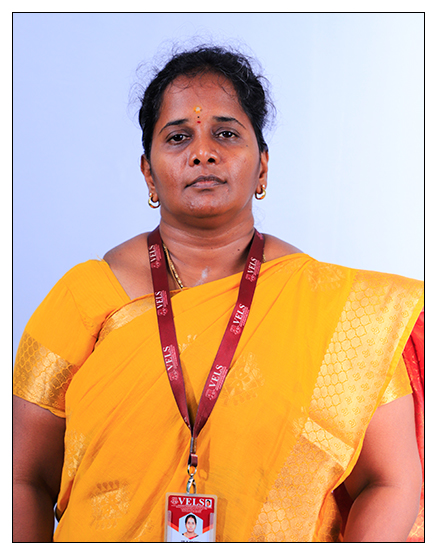 |
| 3 | Dr.C.Shobana | Associate Professor | M.Sc., Ph.D | Neuroscience, Parkinson’s disease, Alzhiemer’s disease, Cardiovascular diseases. | 12 years 1 month | 232492 | 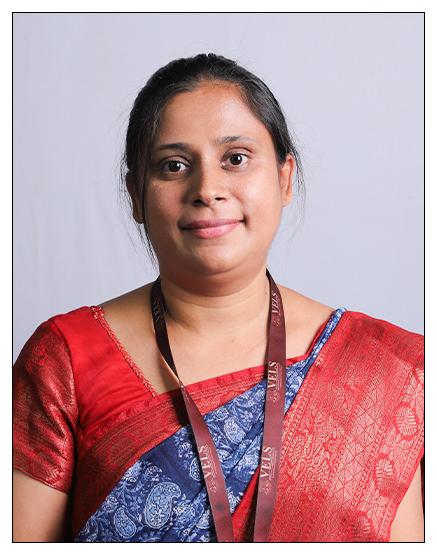 |
| 4 | Dr.Vidya.R | Assistant Professor | M.Sc., M.Phil, Ph.D | Phytotherapeutics, Nanobiotechnology, Clinical Biochemistry and Cancer biology | 9 years 8 months | 250258 | 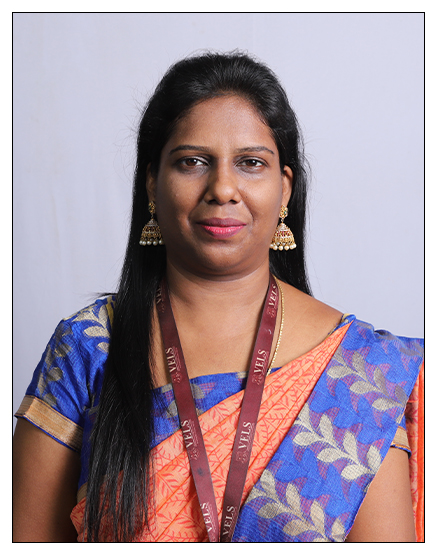 |
| 5 | Dr.Amudha.P | Assistant Professor | M.Sc., M.Phil, Ph.D | Seagrass, Phytochemicals, Nanotechnology & Cancer Biology | 9 years 1 month | 173368 | 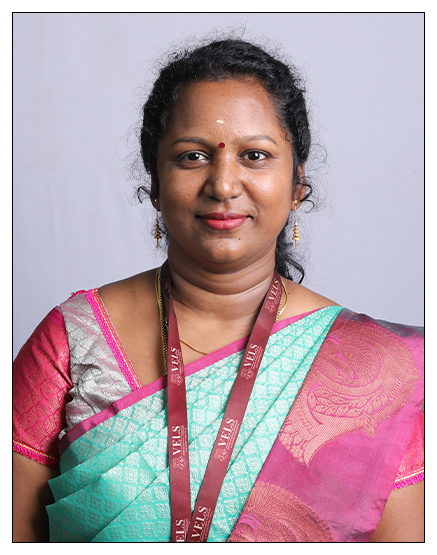 |
| 6 | Dr.Rohini.D | Assistant Professor | M.Sc.,M.Phil,Ph.D | Neurodegenerative diseases, Obesity, Rheumatoid Arthritis | 2 years 8 months | 367575 | 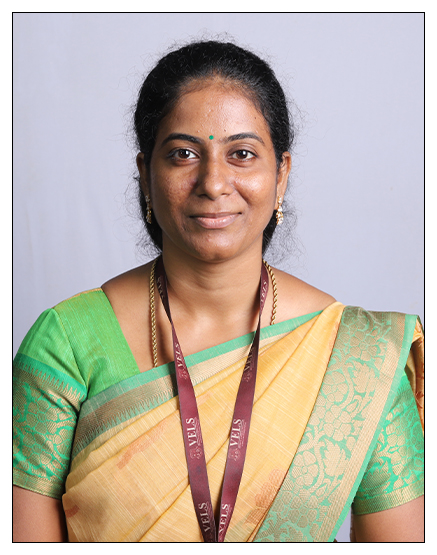 |
 CHAT WITH A STUDENT
CHAT WITH A STUDENT